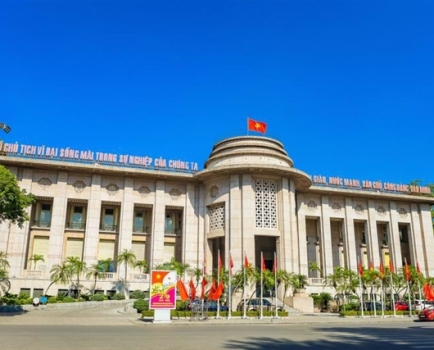Major reforms in the management of state capital in enterprises
Tue, 03 Dec 2024 09:52:00 | Print | Email Share:
The draft Law on Management and Investment of State Capital in Enterprises is set to be presented and discussed at the National Assembly, featuring numerous new provisions after multiple rounds of public consultation. The draft law is expected to bring significant reforms to the operational framework for managing state capital and state-owned enterprises (SOEs).
 |
| The draft Law has more clearly decentralized between state management agencies and capital owner representative agencies. Illustration photo: ST |
Creating a level playing field
According to the Ministry of Finance, the current Law No. 69/2014/QH13 on the Management and Use of State Capital Invested in Production and Business Activities in Enterprises (referred to as Law 69) contains unclear provisions regarding the rights and responsibilities of state capital representatives in enterprises. This lack of clarity has led to excessive interference in the business operations of enterprises.
The revised draft law addresses these shortcomings by stipulating that the State will exercise its rights and obligations as an investor on an equal footing with other investors. The State will not directly interfere in the operations of enterprises but will exercise its ownership rights through designated state capital representative agencies and individuals.
Specifically, Clause 3, Article 5 of the draft law stipulates that once state capital is invested in an enterprise, it is regarded as the property of the enterprise’s legal entity, and government agencies are prohibited from interfering in the enterprise’s management.
Experts argue that defining the State’s role as an investor will empower enterprises to make independent business decisions, foster fair competition with the private sector, and hold them accountable for the effective use of state capital. This approach is expected to drive improvements in operational efficiency.
The current law also faces challenges in delegating authority for managing state capital. According to the Ministry of Finance, critical decisions such as the establishment of enterprises, supplementary capital investments, or state-funded investment projects require the Prime Minister’s approval. This has significantly increased the Prime Minister’s workload, reducing the role of state capital representative agencies.
To address this issue, the draft law proposes clearer delegation of authority between government agencies and state capital representatives. Clause 4, Article 5 specifies that the Government will assign ownership rights and obligations to relevant agencies and enterprise leaders while safeguarding the autonomy of enterprises.
Additionally, the draft law clarifies that enterprise investment projects must comply with public investment laws for approval but are not subject to separate approvals under the draft law.
Commenting on this innovation, Associate Professor Dr. Tran Hoang Ngan, a National Assembly delegate from Ho Chi Minh City and Director of the Ho Chi Minh City Development Research Institute, emphasized the current laws have not kept up with the development of businesses.
According to Dr. Ngan, it is crucial to enhance decentralization and delegation of authority, while clearly separating state management agencies from those representing state-owned capital and entities utilizing, exploiting, and operating state capital entrusted to enterprises. Once capital is transferred to an enterprise, it becomes the enterprise's capital, and thus, its usage and investment should be governed by the Law on Enterprise, Investment Law, and other relevant laws. However, if this capital is still considered as part of the state budget, it will be subject to public investment regulations, hindering the enterprise's ability to seize investment and business opportunities
Restructuring capital and assessing enterprises
Regarding state capital restructuring in enterprises, the current Law 69 allows three approaches: equitization, full sale of enterprises, or partial divestment of state capital.
However, the Ministry of Finance’s reports indicate persistent difficulties in valuing assets, especially projects and infrastructure of significant economic, social, or national security importance. As a result, equitization and divestment efforts have been sluggish and ineffective.
To resolve this, the draft law stipulates that state capital restructuring should be flexible and market-driven, excluding assets critical to national defense and security. The decision-making authority for mergers, acquisitions, or splits involving SOEs will also be assigned to state capital representative agencies to ensure efficient and adaptable management.
According to current law, the evaluation and classification of enterprises is based on comparing the actual performance with the assigned targets. However, at many conferences to contribute to the draft law organized by the Ministry of Finance, many enterprises have expressed disagreement with this regulation due to its limitations, especially when the overall results are good but there are still some loss-making projects or difficulties in management.
Thus, the draft law introduces a more comprehensive evaluation framework, emphasizing overall performance rather than specific indicators and accounting for external factors such as political missions. This change aims to create a fairer environment and enable enterprises to focus on achieving long-term objectives without undue concern for short-term metrics.
Agreeing with this amendment, Associate Professor, Dr. Tran Hoang Ngan emphasized that the most important thing is to have a mechanism for monitoring, inspection, and appropriate evaluation of the business activities of enterprises. According to Mr. Ngan, it is not advisable to blame or conclude that the enterprise leaders are incompetent due to one or two failed investment projects. We should have a comprehensive perspective, as profit and risk always go hand-in-hand in business
The revised draft of the Law on Management and Investment of State Capital in Enterprises represents a significant milestone in improving the management and utilization of state capital. It seeks to create favorable conditions for state-owned enterprises to operate more effectively while positioning the State as an equal investor in a competitive market economy.
By: Customs News
Source: https://english.haiquanonline.com.vn/major-reforms-in-the-management-of-state-capital-in-enterprises-32332.html
---------------------------------------------
Same category News :













